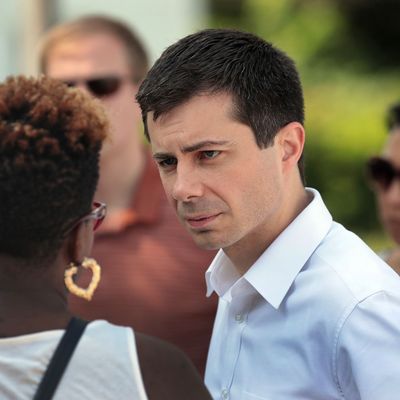
Any Democratic candidate for president really ought to have an explicit agenda for addressing racial inequality in this day and age. African-Americans, in particular, are a sizable and loyal Democratic constituency exposed to untold ongoing damage from the legacy of slavery and Jim Crow, vast educational and economic inequities, and now a Republican Party led by a race-baiting demagogue who openly appeals to white racial resentments.
But 2020 candidate and South Bend mayor Pete Buttigieg has special reason to address this set of challenges. The potential he’s shown as a surprisingly viable candidate with a large fundraising base and demonstrated “charisma” is already hitting a ceiling thanks to an inability to attract minority — and especially black — voters. In a new battery of Change Research polls of early states, Mayor Pete is doing very well in heavily white Iowa and New Hampshire, but terribly in South Carolina, where a majority of primary voters will be African-Americans. Indeed, across the three states in that poll he has a “very favorable” rating of 42 percent from white voters and just six percent from black voters, and is supported by only two percent of African-Americans. Even if the exact numbers are off, the general breakdowns ring true.
To some extent the coolness of black voters toward Mayor Pete may reflect his status as a classic “wine-track” candidate who appeals to upper-income, college-educated white voters as an intriguing cerebral figure — a political luxury to most minority voters focused on practical issues, demonstrated accomplishments, and electability. But he’s got a more specific problem, too: a history of uneven relations with his city’s sizable African-American population centered on the common problem of a disproportionately white police force with an unsavory reputation on racial matters. As I noted earlier this year:
Buttigieg has already gotten some scrutiny for his role in the 2012 demotion of the city’s first African-American police chief, Darryl Boykins, after the chief (perhaps illegally) taped conversations of officers allegedly making racist remarks. That case has tied up the city in years of expensive litigation. Mayor Pete is also trying to overcome criticism of a 2015 speech in which he used the phrase “all lives matter” in the context of police-community relations. He recently apologized for his remarks, saying he didn’t understand its connotations at the time.
So when a white South Bend police officer shot an African-American citizen, Eric Logan, to death last month, under questionable circumstances made much worse by his failure to deploy a mandated body camera to document the incident, it triggered a crisis for Mayor Pete that he has handled with mixed results. His efforts to play honest broker between the police and aggrieved black citizens while independent investigators look into the shooting have not gone over that well in the community. And an otherwise solid performance by Buttigieg in the first candidate debate was made iffier by a direct question concerning his failure to hire more black police officers, followed by a taunt from Eric Swalwell about why he hadn’t managed to fire the current, white police chief. Mayor Pete was earnest and apologetic, but his answer did not satisfy African-American critics back home.
At a critical phase of the campaign when the sheep are beginning to be separated from the goats, Buttigieg knows he must turn the corner on this problem, and presumably that had a lot to do with his announcement this week of a so-called “Douglass Plan” (named after famed ex-slave and abolitionist Frederick Douglass). Subtitled “A Comprehensive Investment in the Empowerment of Black America,” the plan’s 18 pages are summed up by Politico as follows:
The plan proposes investments in key areas that would benefit African Americans, Buttigieg argues. It proposes establishing an a National Health Equity Strategy in order to “train our existing health workforce to combat bias — especially racial bias — when treating patients.”
The Douglass plan would also dramatically increase federal funding for black students in science-related fields and increase resources for students at Title I schools. On entrepreneurship, the proposal calls for tripling the number of black entrepreneurs over the next decade and awarding a quarter of government contracts to “minority business owners.” On housing, the Douglass Plan aims to increase asset ownership by creating a public trust to buy vacant properties and make those properties available to residents. The plan also includes provisions to revitalize and invest in neighborhoods in pilot cities.
Given Buttigieg’s police shooting problem, it’s not surprising that the longest section of the “Douglass Plan” is devoted to criminal-justice reform:
Among the criminal justice reform proposals are halving the incarceration rate at the state and federal level, abolishing private federal prisons and ending or reducing incarceration for drug crimes. The proposal also would double federal funding for states that looking to make criminal justice reforms.
Most pointedly, Buttigieg pledges a national assessment of uses of lethal force by police officers, a higher legal standard for permissible force, and a push to abandon “broken windows–style policing, that are shown to be biased against people of color,” along with independent civilian supervision of law enforcement.
More conventionally, Mayor Pete endorses aggressive expansion and defense of voting rights, and a restoration of the preclearance provisions of the Voting Rights Act of 1965 that were gutted by the Supreme Court four years ago.
All in all it’s a serious, if hardly unique, set of campaign promises. It’s too soon to register how it’s going over in South Bend (the local newspaper’s initial coverage of the “Douglass Plan” was borrowed from the Washington Post), where reactions from African-Americans may affect perceptions of Buttigieg nationally — and in places like South Carolina. But he’s doing what he has to do on his single most glaring weakness as a candidate.






























